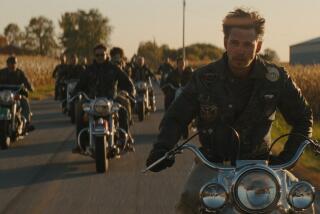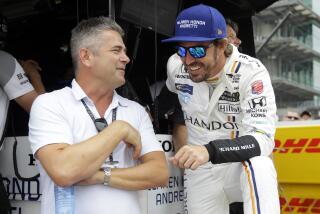Breaking Away
- Share via
Some men take up golf; others sky diving. As he neared 30, Dutch novelist Tim Krabbe did something halfway between these extremes: He began racing bicycles. In less than five years he logged more than 300 races. The Tour de Mont Aigoual, No. 309, is a grueling 137-kilometer, half-day event that he depicts in his nervy and fascinating book “The Rider,” first published in 1978 and now translated into English for the first time.
The story begins five minutes before race time, with Krabbe stuffing figs and orange slices into his pockets. One can almost feel the adrenaline rushing. Wheeling his bike to the starting line, Krabbe introduces us to his friends and foes. There’s Kleber, his training partner; Barthelemy, his onetime nemesis; and Reilhan, a 19-year-old feared for his awesome sprint.
Once the gun goes off, these men begin a battle that has new developments on every page. After a few kilometers, several unknown riders break away from the peloton, the rolling pack that hangs together to cut down wind resistance. Krabbe stays put for the time being, heeding the wisdom of the great cyclist, Henri Pelissier: “Always attack as late as you can, but before the others do.”
As he describes the race, kilometer by kilometer (the course is also a stage in the Tour de France), Krabbe draws on bits of cycling lore. On a treacherous downhill, he remembers the story of a cyclist who spun off a course, only to climb back on his bike and win. As it starts to rain, he thinks back on race 177, when a rider slid over a slick cobblestone surface into an oncoming car. Luckily the rider escaped with a broken leg. (Others have been less fortunate.)
As the race continues, these fears dissolve. Krabbe’s mind begins to resemble “a monolithic ball bearing, so smooth, so uniform, that you can’t even see it spin.” His language, though, grows fractured and intense; his focus is winning.
“This is the crunch,” he writes of the halfway point, as a group of riders make a break: “anyone who’s not in on this one isn’t going to win.... Kleber’s legs are visibly spattering all over the place. I think: butcher. All adjoining parts of my brain--the tactile part, the olfactory, the computing center--are brought in to help think: butcher, butcher. Lebusque is tearing the race apart.”
As the race nears its climax, Krabbe’s narration grows even more feverish, revealing how a simple road race can become the apotheosis of a man’s life. With 37 kilometers to go, Krabbe finds himself in the lead pack. “We are five men hanging motionless by our fingertips from a high windowsill, waiting until someone has to let go.”
Eventually, the race dribbles down to three, and readers should check their pulse if their hands are not sweating. While this degree of suspense is admirable, it’s not this book’s greatest feat. By so effectively capturing the textures of his sport, Krabbe does what no Tour de France broadcast has ever done: He transports the reader inside the head of the rider.


